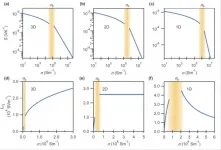Level of chromosomal abnormality in lung cancer may predict immunotherapy response
Dana-Farber researchers find patients whose tumors have low aneuploidy levels often have better outcomes following treatment with immune checkpoint inhibitors
2021-04-10
(Press-News.org) Patients with non-small cell lung cancer (NSCLC) whose cancer cells have low levels of aneuploidy - an abnormal number of chromosomes - tend to respond better to immune checkpoint inhibitor drugs than patients with higher levels, Dana-Farber Cancer Institute researchers will report at the virtual AACR Annual Meeting 2021.
In analyzing data from hundreds of patients with NSCLC who were treated with these drugs, the researchers found that those whose cancer receded tended to have less aneuploidy in their tumor cells than those whose disease remained stable or worsened. These findings suggest that aneuploidy testing can have an important role in determining which treatment is most likely to benefit patients, according to the researchers.
"Aneuploidy is a widespread feature of non-small cell lung cancer and is associated with altered immune signaling; however, the functional significance of cancer aneuploidy remains unclear," said João Alessi, MD, of Dana-Farber who will be presenting the study findings. "Despite the availability of biomarkers for predicting which patients are most likely to respond to checkpoint-inhibiting drugs, less than 50 percent do respond, highlighting the need for new and better markers."
The checkpoint inhibitors used to treat NSCLC target the proteins PD-1 or PD-L1, which deter immune system T cells from attacking tumor cells. By blocking these proteins, the drugs allow the attack to proceed. The discovery by Dana-Farber scientists that PD-1 and PD-L1 can stymie an immune attack on cancer cells laid the foundation for the development of a new generation of checkpoint inhibitors.
For this study, Alessi and his colleagues analyzed data from 279 patients with NSCLC who had been treated with PD-1 or PD-L1 inhibitors. Each tumor was assigned an aneuploidy score from 0-39 based on the number of altered chromosome arms within its cells. The researchers used this information to explore whether aneuploidy score was linked to the effectiveness of treatment.
They found that patients with complete or partial responses (complete or partial shrinkage of their tumors) to checkpoint inhibitors had significantly lower aneuploidy scores than those with stable or progressive disease. Patients with cancer aneuploidy scores less than or equal to 2 had significantly higher overall response rates (43% vs. 19.8%), significantly longer progression-free survival (6.2 vs. 2.9 months), and significantly longer overall survival (19.8 vs. 13.8 months) than patients with aneuploidy scores greater than 2.
Aneuploidy score was significantly associated with progression-free and overall survival even after adjusting for other factors, such as performance status, oncogenic driver mutation, PD-L1 expression, tumor mutational burden, and line of treatment. After adjustment, patients with aneuploidy scores less than or equal to 2 were 28% and 36% more likely to have improved progression-free and overall survival, respectively, compared with patients with aneuploidy scores greater than 2.
Alessi and his colleagues also found that tumors with low aneuploidy scores had significantly higher numbers of immune cells positive for the CD8, Foxp3, and PD-1 proteins. The presence of these inflammatory markers indicates that tumors with low aneuploidy may be more likely to come under immune system attack than those with higher aneuploidy levels, which could contribute to increased responses to immune checkpoint inhibition. Aneuploidy score was not associated with PD-L1 expression or tumor mutational burden, suggesting that aneuploidy score could serve as an independent predictive biomarker.
"Our report provides a sizeable advance to understanding how aneuploidy correlates with response to treatment, making it a potential biomarker for the effectiveness of immunotherapy in patients with NSCLC," said Alessi. "Incorporating aneuploidy score in molecular testing may aid treatment decisions and clinical trial design."
INFORMATION:
Alessi will present findings on this study during the Minisymposium session, Clinical Research Excluding Trials topic track, Abstract 26 on Saturday, April 10 at 2:35 p.m. EST.
[Attachments] See images for this press release:

ELSE PRESS RELEASES FROM THIS DATE:
2021-04-10
Tokyo, Japan - Researchers from Tokyo Metropolitan University have shown that a quantity known as "thermoelectric conductivity" is an effective measure for the dimensionality of newly developed thermoelectric nanomaterials. Studying films of semiconducting single-walled carbon nanotubes and atomically thin sheets of molybdenum sulfide and graphene, they found clear distinctions in how this number varies with conductivity, in agreement with theoretical predictions in 1D and 2D materials. Such a metric promises better design strategies for thermoelectric materials.
Thermoelectric devices take differences in temperature between different materials and generate electrical energy. The simplest example is two strips of ...
2021-04-10
From power grids and telecommunications to water supply and financial systems, digital data controls the infrastructure systems on which society relies. These complex, multi-tier systems depend on layered communications to accomplish their tasks - yet every point of contact becomes a potential target, every path of information a potential weak spot for malicious actors to attack.
A team of researchers from the University of Calabria in Italy has developed the first predictive control scheme that can help distributed networks with multiple agents not only identify these ...
2021-04-09
Active surveillance leads to improved quality of life
Men with low health literacy seven times less likely to accept active surveillance
Prostate cancer and active surveillance patient education is needed
Tumor gene profiling is a tool that can help patients with a cancer diagnosis make informed decisions about treatment. In predominantly white populations, among men with early stage, favorable-risk prostate cancer, these tools have been shown to increase patient acceptance of active surveillance -- a common, evidence-based approach to monitor the tumor before a more aggressive treatment, like surgery or radiation.
However, ...
2021-04-09
A new study finds older adults who received positive airway pressure therapy prescribed for obstructive sleep apnea may be less likely to develop Alzheimer's disease and other kinds of dementia.
Researchers from Michigan Medicine's Sleep Disorders Centers analyzed Medicare claims of more than 50,000 Medicare beneficiaries ages 65 and older who had been diagnosed with OSA. In this nationally representative study, they examined if those people who used positive airway pressure therapy were less likely to receive a new diagnosis of dementia or mild cognitive impairment over the next 3 years, compared to people who did ...
2021-04-09
Auroral displays continue to intrigue scientists, whether the bright lights shine over Earth or over another planet. The lights hold clues to the makeup of a planet's magnetic field and how that field operates.
New research about Jupiter proves that point -- and adds to the intrigue.
Peter Delamere, a professor of space physics at the University of Alaska Fairbanks Geophysical Institute, is among an international team of 13 researchers who have made a key discovery related to the aurora of our solar system's largest planet.
The team's work was published April 9, 2021, in the journal Science Advances. The research paper, titled "How Jupiter's unusual magnetospheric topology structures its aurora," was written by Binzheng ...
2021-04-09
For the first time, researchers have been able to obtain data from underneath Thwaites Glacier, also known as the "Doomsday Glacier". They find that the supply of warm water to the glacier is larger than previously thought, triggering concerns of faster melting and accelerating ice flow.
With the help of the uncrewed submarine Ran that made its way under Thwaites glacier front, the researchers have made a number of new discoveries. Professor Karen Heywood of the University of East Anglia commented:
"This was Ran's first venture to polar regions and her exploration of the waters under the ice shelf was much more successful than we had dared to hope. We plan to build on these exciting findings ...
2021-04-09
Tick-borne encephalitis is a disease just as nasty as it sounds. Once bitten by an infected tick, some people develop flu-like symptoms that resolve quietly but leave behind rampant neurological disease--brain swelling, memory loss, and cognitive decline. Cases are on the rise in Central Europe and Russia with some 10,000 incidents reported each year. Vaccines can provide protection, but only for a limited time. There is no cure.
Now a new study describes antibodies capable of neutralizing the virus transmitted by tick bites. These so-called broadly neutralizing antibodies have shown promise in preventing TBE in mice and could inform the development of better vaccines for humans. ...
2021-04-09
Children may not be as infectious in spreading SARS-CoV-2 to others as previously thought, according to new University of Manitoba-led research in CMAJ (Canadian Medical Association Journal).
"Our findings have important public health and clinical implications," writes principal investigator Dr. Jared Bullard, associate professor, pediatrics/child health and medical microbiology/infectious diseases, Max Rady College of Medicine, University of Manitoba and associate medical director, Cadham Provincial Laboratory in Winnipeg, Manitoba. "If younger children are less capable of transmitting infectious virus, daycare, in-person school and cautious extracurricular activities may be safe to continue, with appropriate precautions in place, ...
2021-04-09
When setting SARS-CoV-2 vaccine priorities, Canada should take a more nuanced approach that considers geographic and occupational risk exposures, as 75% of Canadian adults have at least 1 risk factor for severe COVID-19, argues an analysis in CMAJ (Canadian Medical Association Journal).
"Using risk factors for severe COVID-19 in a strategic vaccination strategy may not offer much refinement because of how widespread these conditions are. More detailed weighting of medical, geographic and occupational risks might be required if vaccination is constrained," writes Dr. Finlay McAlister, Faculty of Medicine & Dentistry, University of Alberta, Edmonton, Alberta, with coauthors. "In particular, since the third wave of the COVID-19 pandemic appears ...
2021-04-09
Excessive CO2 emissions are a major cause of climate change, and hence reducing the CO2 levels in the Earth's atmosphere is key to limit adverse environmental effects. Rather than just capture and store CO2, it would be desirable to use it as carbon feedstock for fuel production to achieve the target of "net-zero-emissions energy systems". The capture and conversion of CO2 (from fuel gas or directly from the air) to methane and methanol simply using water as a hydrogen source under ambient conditions would provide an optimal solution to reduce excessive CO2 ...
LAST 30 PRESS RELEASES:
[Press-News.org] Level of chromosomal abnormality in lung cancer may predict immunotherapy response
Dana-Farber researchers find patients whose tumors have low aneuploidy levels often have better outcomes following treatment with immune checkpoint inhibitors





